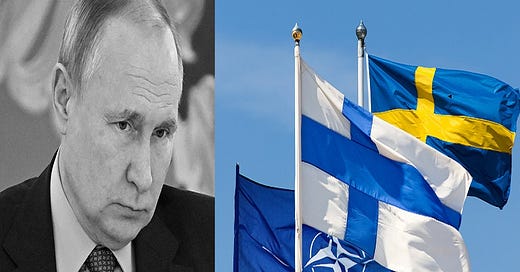Is NATO’s Northern Expansion Really A Major Defeat For Russia?
There are a few fatal flaws in this narrative that discredit the point being put forth.
The US-led Western Mainstream Media (MSM) is busy pushing the weaponized information warfare narrative that Finland and Sweden’s invitation to join NATO is supposedly a major defeat for Russia that contradicts the aim that President Putin sought to achieve through his country’s ongoing special military operation in Ukraine. According to them, the northern expansion of NATO wouldn’t have been possible had he not authorized that campaign, which supposedly puts his country in more danger than before.
There are a few fatal flaws in this narrative that discredit the point being put forth. First, Finland and Sweden were already de facto members of the bloc for years so their official membership doesn’t really change anything. Second, NATO hasn’t established clandestine military infrastructure there (yet) like it did in Ukraine over the past years. Third, neither of those two have territorial disputes with Russia that could lead to war with NATO nor are they capable of creating anti-Russia projects like Ukraine is.
Regarding the first point, they’ll come under the US’ nuclear umbrella soon enough, but that’s the only real change that’ll happen. As for the second, Russia already promised to respond to the deployment of the bloc’s military infrastructure in Finland and Sweden, which means that whatever latent threats might materialize there are manageable, at least in theory. Lastly, them joining NATO won’t lead to any territorial disputes or creation of anti-Russian projects since neither are realistic given their situations.
It's for these primary reasons why President Putin said on Wednesday during a press conference after the Caspian Summit in Ashgabat that “There is nothing that could inspire our concern regarding Finland and Sweden’s accession to NATO. If they want it, they can do it.” He also mentioned the points above throughout the relevant part of his speech. This insight is crucial to keep in mind for debunking the MSM’s latest infowar claims against Russia, the purpose of which will now be analyzed.
CNN reported on Tuesday coincidentally at the start of the NATO Summit that “Biden officials privately doubt that Ukraine can win back all of its territory”. This follows the “official narrative” on the conflict decisively shifting over the past month from “victory porn” about Kiev’s “inevitable success” against Russia to “fear porn” about Russia “invading” NATO once Kiev loses, the latter of which was on full display following Lithuania’s politically motivated partial blockade of Kaliningrad.
That second-mentioned development wasn’t driven by a sincere desire to provoke Russia into a war with NATO, but to shape perceptions among the Western public that this is now supposedly more plausible than before, which also serves to distract from Kiev’s losses in Donbass. While the G7 and NATO agreed to continue supporting Kiev indefinitely, it’s inevitable that the conflict will end with their proxy’s defeat and associated territorial losses, ergo CNN’s report.
Considering the fact that such an outcome would be beyond embarrassing after Kiev received over $54 billion in support from the US and a handful of billion more from other NATO countries, which collectively claim to be the most powerful military alliance in human history, it’s important to preemptively manufacture an artificial narrative that can still be spun as a “success”. This, more so than anything else, explains the false claim that NATO’s northern expansion is a major defeat for Russia.
It's not, though, for the reasons that were already explained, but it serves the purpose of being “opium for the masses” and getting their people to accept that their tens of billions of dollars’ worth of taxpayer funds accomplished something tangible in their name even if their side’s proxy lost more territory. This weaponized narrative is also meant to cushion the blow of skyrocketing inflation by making it seem like it was worth suffering such in order to “save those Scandinavian states’ democracy”.
The last observation to make is that the US-led West will continue doubling down on its false claim that the New Cold War and subsequent “Great Bifurcation” are all about “democracy vs. authoritarianism”. This is nothing but a desperate narrative coping mechanism to spin Kiev’s inevitable defeat as a “victory” on the basis that NATO expanded northwards as a result of the conflict. The reality, however, is that this isn’t a major defeat for Russia but just a means of distracting from the US’ declining unipolar hegemony.




